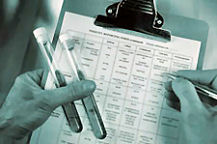

Home Page
The latest articles, features and news.


Read About...


Search Articles



Discussion Forums




|
| | |
|
17 May 2011
New prostate cancer test gets thumbs-up
by George Atkinson  A new test that measures prostate specific antigen (PSA) levels as well as six specific antibodies found in the blood of men with the disease is superior to the conventional PSA test, say researchers at UCLA's Jonsson Comprehensive Cancer Center. "This is a very promising new approach," researcher Gang Zeng said. "Instead of using just one parameter, PSA, to test for prostate cancer, we use multiple parameters that can be measured in a single reaction." Importantly, the new test, called the A PSA assay, also reduced the rate of false-positives.
A new test that measures prostate specific antigen (PSA) levels as well as six specific antibodies found in the blood of men with the disease is superior to the conventional PSA test, say researchers at UCLA's Jonsson Comprehensive Cancer Center. "This is a very promising new approach," researcher Gang Zeng said. "Instead of using just one parameter, PSA, to test for prostate cancer, we use multiple parameters that can be measured in a single reaction." Importantly, the new test, called the A PSA assay, also reduced the rate of false-positives. The conventional PSA test for prostate cancer has been used for nearly 30 years but doctors say it is not specific enough in delineating between malignancies and non-malignant diseases of the prostate, such as benign prostatic hyperplasia (BPH) or prostatitis. Zeng explained that the A PSA assay looked simultaneously for PSA and antibodies to the six prostate-cancer associated antigens in a single reaction test done in a laboratory. In the new test, sensitivity - the percentage of men with prostate cancer who were correctly identified as having a malignancy - was 79 percent compared to the 52 percent found in PSA testing. The rate of false-positives using conventional PSA testing is 21 percent. With the new A PSA assay, the false-positive rate is 16 percent.
"Science has improved so much since the PSA test was developed and I think it's time for a more specific and sensitive test," Zeng said. "I think we have a test that has great potential to improve the diagnosis of prostate cancer. I knew it would be better than the classic PSA test, but I was amazed at how much better it really was in this study." Zeng and his team are working now to adjust and improve the statistical index used in their test to generate the "score." There also are additional antibodies that could be added to the assay that may improve both the sensitivity and specificity of the test, he said. "Different men may have different levels of the six antibodies or different antibodies all together based on their race, age and ethnicity," Zeng said. Related:
Prostate screening guidelines in need of revamp
PSA Test Of Dubious Benefit For Elderly
Replacement For PSA Test Mooted Source: University of California - Los Angeles Health Sciences
|
|





